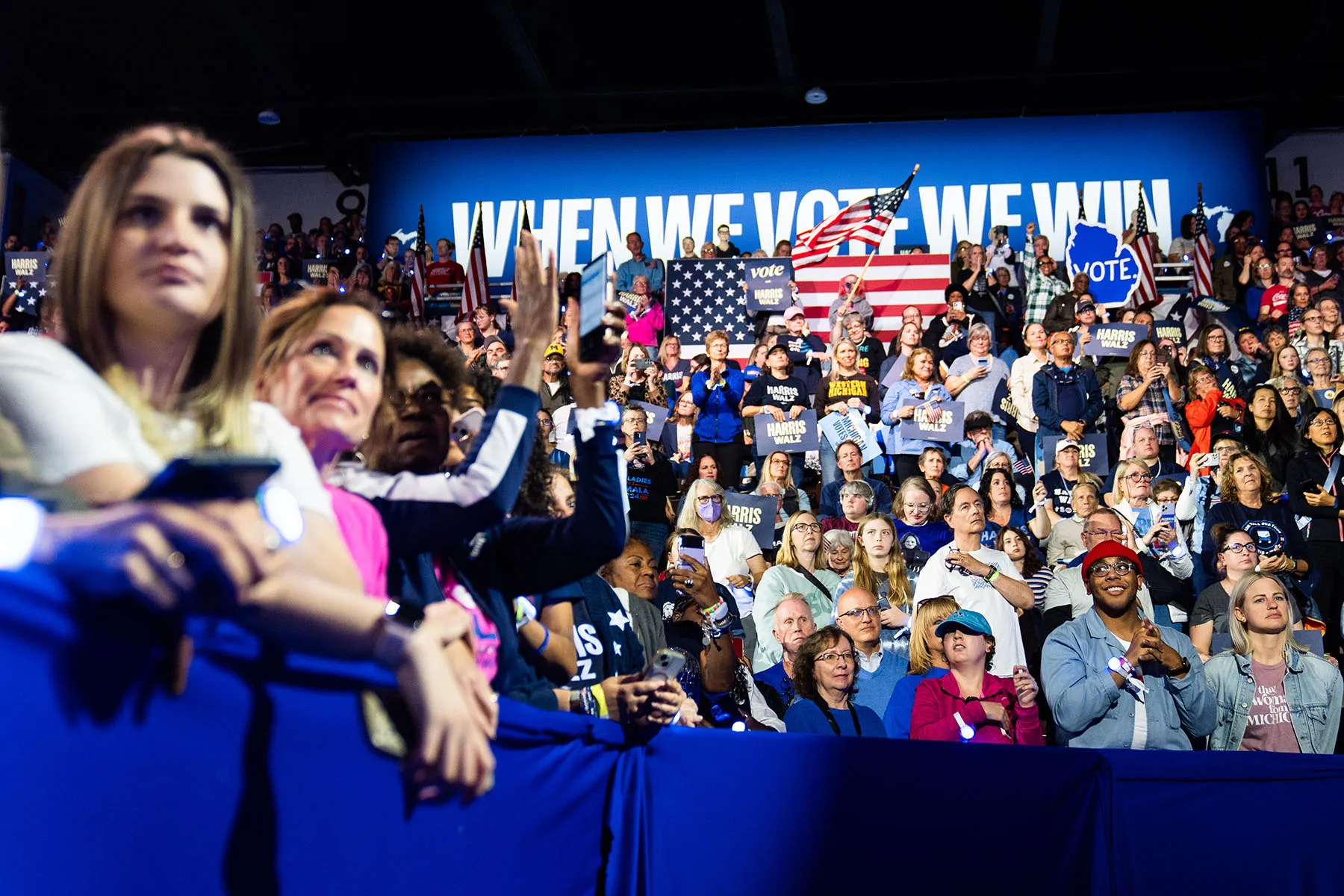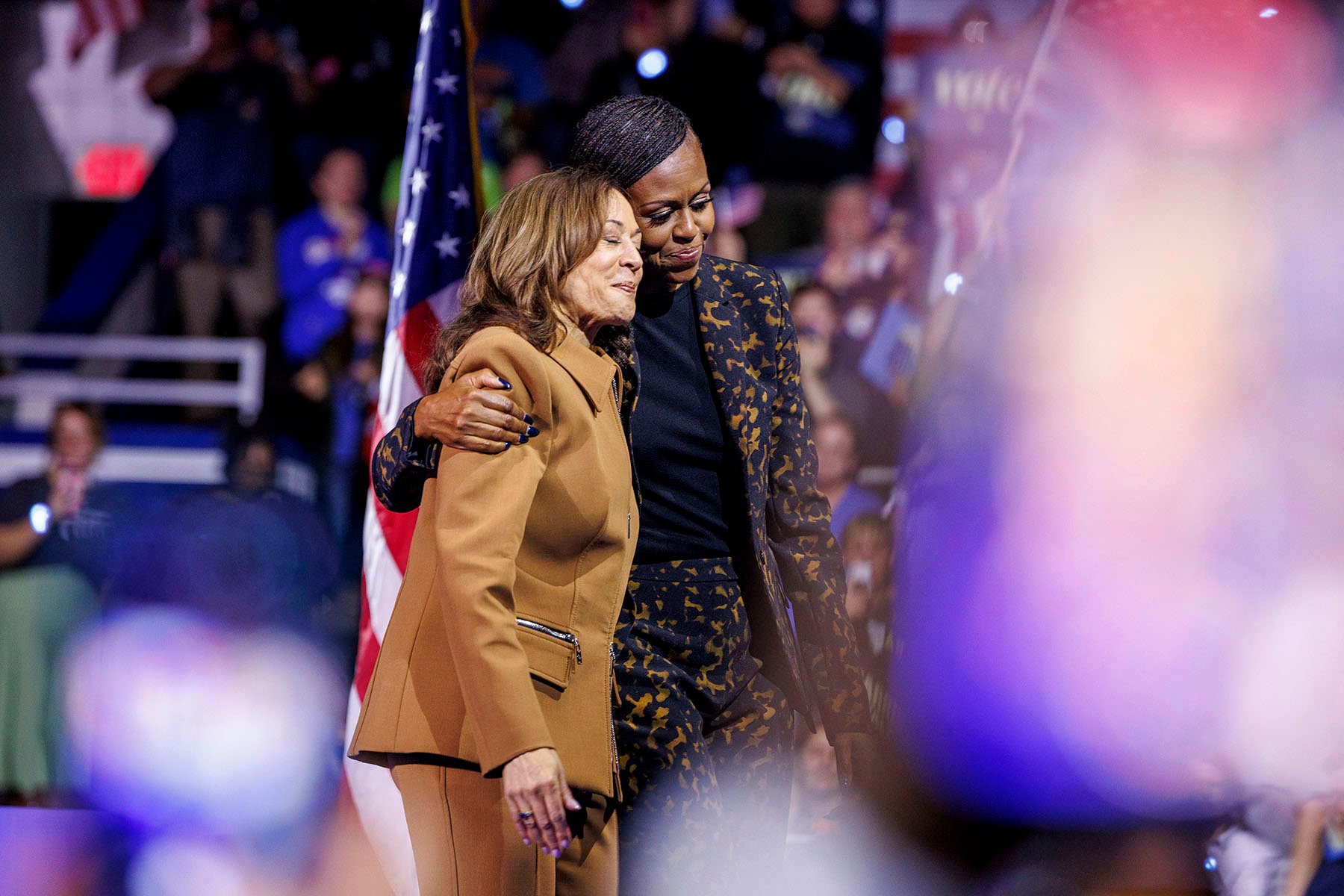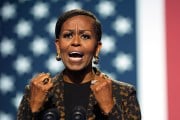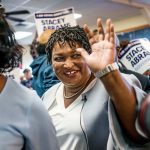The 19th is committed to covering the unfinished business of voting rights. Read more about how we’re approaching that in this pivotal election.
KALAMAZOO, Michigan — On the first day of early voting in Michigan, former first lady Michelle Obama and Vice President Kamala Harris — two of the most politically powerful Black women in America — spelled out the stakes of the 2024 presidential election by underscoring the importance of accessing the ballot.
Obama and Harris spoke directly to would-be voters who may be disinclined to turn out or on the fence about voting — but who might make the difference in a race that could have razor-thin margins in key battleground states.
“If you are a woman who lives in a household of men that don’t listen to you or value your opinion, just remember that your vote is a private matter,” Obama said Saturday at a rally where she also said women’s bodies are on the line in this election. “You get to choose. You get to use your judgment and cast your vote for yourself and the women in your life. Remember, women standing up for what is best for us can make the difference in this election.”
When Harris later took the stage, the Democratic presidential nominee gave a shout out to Gen Z, noting that the people in this powerful voting bloc have had to contend with the effects of policy inaction on issues like climate change, reproductive health and gun violence.
“I see you, and I see your power,” she said to applause. “And I know many of you are voting for the first time … can we hear it for our young leaders and first-time voters?”
Making it easier for people to vote is a central issue for both women, who have championed policy proposals and civic engagement to drive home the importance of enfranchisement. Their record could carry extra resonance in a presidential election that has been increasingly framed as one about the future of democracy.
-
Read Next:
While Obama has largely eschewed partisan politics since her husband left the White House, she has focused some of her energy on When We All Vote, the nonpartisan voter engagement initiative she founded in 2018.
And when Biden announced in 2021 that his administration would focus on expanding voting rights, he tapped Harris to take the lead — at her personal request.
“Every American has a right to have their voices heard at the ballot box, and no American should be kept from voting early, voting by mail, or voting at all,” Harris said in a statement at the time. “Our democracy is strongest when everyone participates, and it is weaker when people are left out.”
In recent weeks, Harris’ campaign has tried to draw a stark contrast between how she and former President Donald Trump view elections. Trump tried to overturn the 2020 election results, and said earlier this year that he will only accept the results of this year’s presidential election if it’s “fair and legal and good.” For months, the former president has primed his supporters to expect voter fraud — a speculative assertion not based in fact but an extension of election denialism messaging that spans years and is expected to play a role during vote counting.
Harris has also recently called Trump a fascist who will implement authoritarian policies. During the vice presidential debate on Oct. 1, Minnesota Gov. Tim Walz asked U.S. Sen. JD Vance about whether Trump lost the 2020 election. Vance, who has said he would have called for new electors instead of certifying that election, did not answer the question.
Trump’s threats to democracy weighed heavily on women at the Saturday rally.
“We can’t go back,” said Chantal Hoey-Sanders, who lives in Grand Rapids and came to the event with her sister. She said Trump’s agenda and the policies laid out in the Heritage Foundation’s Project 2025 are her top concerns.
“We don’t want a dictator, we want a unifier,” she said.
During Harris’ speech in Michigan, the vice president also briefly highlighted policy efforts to restrict voting, including a Georgia law that changed rules for mail voting, limited drop boxes and prohibited, under certain circumstances, people passing out water and food while voters are in line to cast a ballot.
“The hypocrisy abounds. What happened to love thy neighbor?” she said.
Obama’s message on voting and privacy was directed primarily toward White women, a critical voting demographic that is often credited with helping Trump win the presidency in 2016.
Now, nearly a decade later, the second woman to win a party’s nomination for president is vying for their support. Part of her political tactic is messengers like Obama who are highlighting the loss of federal abortion protections and how it’s deepening longstanding gender divides within the American electorate.
Across Democratic and nonpartisan campaigns, operatives say they’ve been fielding concerns from women about whether their votes will really be private. Betty Cartledge, an 81-year-old voter in Georgia, made national headlines when she told a local news station she was casting her first ballot because her husband, who died the prior year, did not believe she should vote.
In an ad from Vote Common Good, a progressive evangelical group supporting Harris, actor Julia Roberts reminded Christian women their vote is confidential. “In the one place in America where women still have a right to choose, you can vote any way you want and no one will ever know,” she said.

Emily Wales, president and CEO of Planned Parenthood Great Plains (PPGP) and PPGP Votes, which is part of a coalition working to overturn Missouri’s abortion ban with a constitutional amendment, said it’s been “upsetting” that her staff has had to field questions about whether votes are confidential.
“We’ve definitely heard from some women who’ve asked if their husbands and partners get to find out how they voted, which is a pretty heartbreaking thing to hear for us, just imagining that you would be even in a relationship where you’d feel at risk,” she added.
This is the first year of early voting in Michigan, after voters approved a state constitutional amendment in 2022 that expanded voting before Election Day. The changes also established protections against voter intimidation and interference in the certification of elections at the local level. On Saturday, more than 145,000 people cast ballots, which state officials say exceeded expectations.
Harris briefly highlighted voting rights during her nomination acceptance speech at the Democratic National Convention in August. In her remarks, she described access to the ballot as “the freedom that unlocks all the others.”
“With this election, we finally have the opportunity to pass the John Lewis Voting Rights Act and the Freedom to Vote Act,” she said.
The John Lewis Voting Rights Act, named after the late congressman and civil rights leader, would restore protections first enshrined in the Voting Rights Act of 1965, which bans racial discrimination in voting. Recent Supreme Court rulings have weakened some of its provisions, according to voting experts.
The Freedom to Vote Act would expand early voting, mail-in voting, voter registration processes, and other aspects of voting accessibility. It would also ban gerrymandering and change the country’s campaign finance system.
The pieces of legislation have stalled in Congress, where Democrats overwhelmingly support the measures but lack enough support from Republicans. Those dynamics are likely to continue if Republicans maintain or flip power in either chamber this November.
Still, the stalemate on congressional action hasn’t stopped Harris and the administration from finding other ways to address voting accessibility for historically disenfranchised communities. Months before Harris’ unexpected ascension to the top of the ticket, she convened voting rights and civic engagement groups to highlight federal agency efforts to promote voter registration and recruit nonpartisan poll workers.
Harris is set to make the closing argument for her campaign in a Tuesday speech at the Ellipse on the National Mall, a symbolic location where Trump spoke on January 6 prior to the insurrection at the U.S Capitol. Harris is expected to highlight what she views as Trump’s existential threats to democracy.
Before Obama and Harris spoke on Saturday, Michigan Lt. Gov. Garlin Gilchrist led the crowd in chants of “Stand tall” and “Vote early!”
“We pound the pavement, we talk to our friends and family, and we do not take a single vote for granted,” said U.S. Sen. Gary Peters, adding that “the whole world is watching what’s happening in Michigan.”
Sheri Millard, a 62-year-old Harris supporter who lives in Kalamazoo, said reproductive rights is top of mind. While economic issues, including high prices, have driven many to support Trump, she believes the threats he poses to women’s rights and democracy are much greater.
“You can get your cheap gallon of milk back, but not your freedom,” she said.
In her speech, Obama harkened back to the legacy of the Civil Rights Movement.
“I am praying that those of us contemplating voting for Trump or not voting at all will snap out of whatever fog we are in,” she said. “I am praying that we consider the decades of sacrifice and struggle by all of our ancestors, the folks who marched and sacrificed and shed their blood for us. We have to ask ourselves, is a vote for Trump or no vote at all the way we honor their lives? And if that’s the case, well that surely doesn’t sound like freedom to me.”
To check your voter registration status or to get more information about registering to vote, text 19thnews to 26797.






